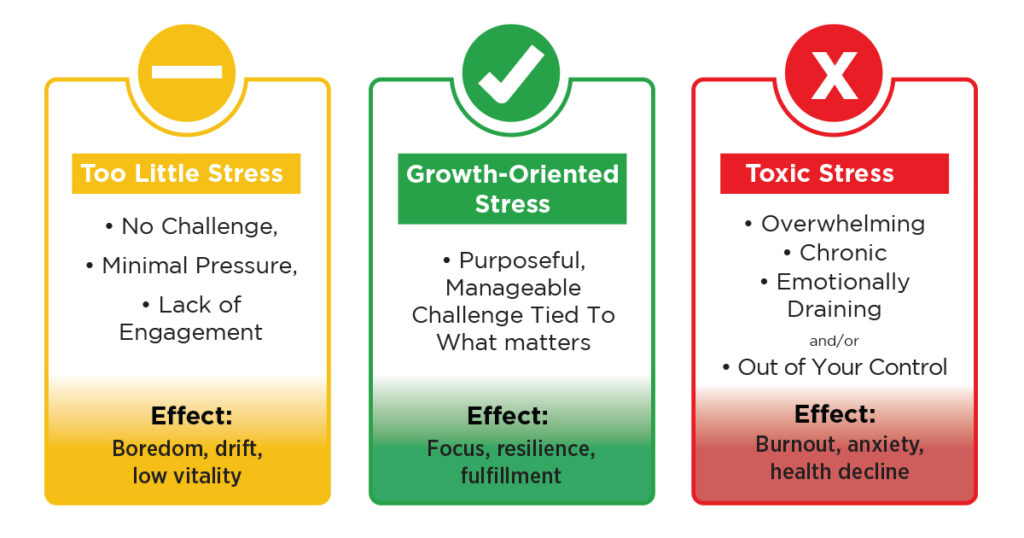Why Some (Healthy) Stress Is Good
In a previous post, we explored the difference between good stress and toxic stress. Good stress fuels growth, builds confidence, and strengthens resilience. Toxic stress, by contrast, overwhelms us and can lead to burnout and long-term health issues.
But there’s a third category we rarely talk about: the nearly complete absence of stress.
At first glance, a stress-free life may sound ideal. Yet research suggests that too little stress can leave us stagnant, disengaged, and unfulfilled.

When the Absence of Stress Becomes a Problem
In a landmark study of 2,398 people, psychologist Mark D. Seery found an inverted U-shaped curve: individuals with moderate levels of lifetime adversity had better mental health and greater life satisfaction than those with either too little or too much stress.¹
Follow-up studies revealed that people with moderate past adversity were more emotionally and physiologically resilient when facing new stressors.²
Why does some stress seem to be the sweet spot? Because manageable stress builds coping skills, self-efficacy, and performance under pressure. But on a deeper level, the more basic reason is that we’re wired not just for comfort—but for seeking challenge and purpose.
Meeting our basic physical needs isn’t enough for sustained well-being. Human beings crave meaning, contribution, and growth. When we live with purpose, we feel energized and connected. When we lack it, we often feel a vague restlessness—a signal that something important is missing.
Why Boredom Hurts
This helps explain why boredom is so unpleasant. While rest is necessary, prolonged purposelessness clashes with our psychological wiring. We need challenge—not chronic pressure, but enough of a stretch to keep us engaged.
Retirement: The Myth of “Stress-Free” Bliss
This truth becomes especially relevant in retirement—a stage often idealized as a chance to become completely “stress-free.” The break from deadlines and work stress can be liberating at first, but over time, many retirees experience a surprising void: the loss of structure and purpose.
Research confirms this. The MacArthur Study of Successful Aging found that retirees who rarely felt “useful” were significantly more likely to develop disability or die earlier—even after controlling for age and baseline health.³ Other studies link purpose to improved physical and mental health, stronger cognitive function, and greater longevity.
The most fulfilled retirees often reintroduce healthy stress—through part-time work, volunteering, creative expression, or continued learning. Without it, even leisurely days can start to feel hollow.
Life Stages Where Low Stress Can Backfire
The cost of too little stress isn’t limited to retirement. It can show up at any stage:
- School Years – Gifted students without challenge often become bored and disengaged. Struggling students without support may give up altogether.
- Early Adulthood – After college, a lack of direction can lead to anxiety, drift, and identity confusion.
- Midlife Plateau – Professionals who stop learning or growing may feel stagnant or unmotivated, even if their careers seem stable.
- Empty Nest Phase – Parents may lose routine and identity when children move out, leading to boredom or a sense of emptiness.
The Real Challenge
Boredom and drift can creep in at any life stage. When they do, we must take responsibility for restoring meaningful structure. This might mean learning a new skill, starting a creative project, volunteering, or committing to daily rituals like exercise, journaling, or meditation.
Here’s the real challenge: unlike hunger or fatigue, the need for purpose doesn’t come with flashing warning lights. Instead, it shows up as low energy, tension, or vague dissatisfaction. And in our hyper-stimulated world, we often misinterpret that signal—reaching for entertainment or comfort when what we truly need is engagement and purpose.
This is where self-awareness becomes essential. We must learn to ask: Is my restlessness a cue to recharge—or a cue to re-engage?
Healthy Stress: The Antidote to a Numb Life
We live in a culture that warns us about the dangers of stress but rarely talks about the dangers of its absence. Yet when we eliminate all pressure and challenge, we don’t find peace—we find drift. Slowly, quietly, it erodes our sense of vitality.
The real goal isn’t to eliminate stress; it’s to cultivate the kind that propels us forward—the kind that asks something of us, stretches us, and deepens our sense of meaning. Purposeful challenge isn’t a burden. It’s how we stay awake to our own potential.
So instead of asking “How can I avoid stress?”, try asking “What’s helping me grow?” That simple shift can reconnect you to the kind of energy that sustains us—not just through activity, but through a deeper engagement with life itself.
Because in the end, the real cost of a stress-free life isn’t rest. It’s the quiet fading of who we’re meant to become.
A Wake-Up Call to Reengage
If your days feel flat or vaguely restless, pay attention—boredom is often a quiet alarm bell, signaling the need for change. Rather than brushing it aside or numbing it away, use that signal. Ask yourself:
- When was the last time I felt truly alive—focused, challenged, or proud of something I did?
- What small challenge or project could add more purpose or excitement to my day?
It doesn’t have to be dramatic. Learn something new. Pick up an old interest. Volunteer. Start a creative side project. Break your routine.
Whatever it is, take one step. Don’t wait for purpose to find you. Build it.
Boredom isn’t a flaw—it’s a prompt. And if you listen, it might just be your next turning point.
REFERENCES
- Seery MD, Holman EA, Silver RC. Whatever does not kill us: cumulative lifetime adversity, vulnerability, and resilience. J Pers Soc Psychol. 2010; 99:1025-41. doi: 10.1037/a0021344.
- Seery MD, Leo RJ, Lupien SP, Kondrak CL, Almonte JL. An upside to adversity?: moderate cumulative lifetime adversity is associated with resilient responses in the face of controlled stressors. Psychol Sci. 2013; 24:1181-9. doi: 10.1177/0956797612469210.
- Gruenewald TL, Karlamangla AS, Greendale GA, Singer BH, Seeman TE. Feelings of Usefulness to Others, Disability, and Mortality in Older Adults: the MacArthur Study of Successful Aging. J Gerontol B Psychol Sci Soc Sci. 2007; 62:p28-37. doi: 10.1093/geronb/62.1.p28.



